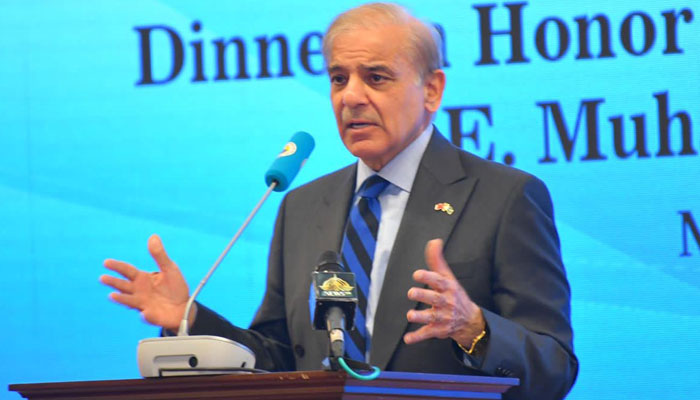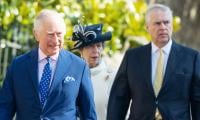PM Shehbaz Sharif sets $5bn target for trade with Turkey
Shehbaz said the government had done away with all the impediments to the business sector and urged the Turkish investors to invest their capital in sectors like agriculture, IT, dairy, textile, and many other fields
ANKARA: Prime Minister Shehbaz Sharif Tuesday urged the business community of Pakistan and Turkey to take the bilateral trade to $5 billion in three years.
“The $1.1 billion trade is nothing. Let us resolve to take the two-way trade to $5 billion. Let us do it speedily. The time and tide wait for none,” he told a dinner reception hosted by the President of the Union of Chambers and Commodity Exchanges of Turkey (TOBB), Riffat Hisarciklioglu, for him.
A large number of businessmen from the Turkey-Pakistan Business Forum, Turkish and Pakistani investors and officials from the Boards of Investment of Turkey and Pakistan attended the event. The Prime Minister said the government had done away with all the impediments to the business sector and urged the Turkish investors to invest their capital in sectors like agriculture, IT, dairy, textile, and many other fields. “My investors are my masters. Come to Pakistan. We will genuinely roll out the red carpet for them,” he remarked.
The Prime Minister also assured the Turkish investors that they would face no hurdles in their future ventures in Pakistan, as they had been facing over the last four years. He also thanked the Turkish people and the leadership for supporting Pakistan during the earthquake and floods, besides showing its unwavering support for the Kashmir cause. He also reiterated Pakistan’s stance to support Turkey on the Cyprus issue.
The Prime Minister said unfortunately the historic friendship did not reflect in the bilateral trade which currently stood at $1.1 billion. He also mentioned the contribution of the Turkish companies to Pakistan in the field of solid waste management and their keen interest in solar energy projects.
Referring to the recent launch of the third PN MILGEM corvette for Pakistan Navy PNS BADR, the Prime Minister also called for deepening the bilateral defense ties, calling the enemy of Turkey an enemy of Pakistan. He urged the businessmen from both sides, attending the event, to have “heart-to-heart” talks for promoting bilateral trade and investment.
Regarding some issues faced by the Turkish businessmen with visa, he promised to work out an option of visa-on-arrival for Turkish investors. “I guarantee you. The visa will not be an issue. You should come there and get stamped (visa) at the airport.”
Earlier, Prime Minister Shehbaz Sharif reached Turkey on a three-day visit, his first since assuming office last month. A high-level delegation including Defence Minister Khawaja Asif, Information Minister Marriyum Aurangzeb, Investment Board Chairman/Minister Chaudhry Salik Hussain, PM’s special assistants Tariq Fatemi and Fahad Hussain also accompanied the Prime Minister while Foreign Minister Bilawal Bhutto Zardari will join the delegation later.
As the Prime Minister landed at Ankara’s Esenbo a Airport, Turkish Defence Minister Hulusi, senior government officials and diplomatic personnel gave the premier a warm welcome. A smartly turned-out contingent of the Turkish Army presented a salute to the Prime Minister.
Meanwhile, Prime Minister Shehbaz Sharif has said Pakistan and Turkey enjoy the similarity of ideas on international and regional issues and closely collaborate with each other at all international forums. In an interview to Turkish news agency Anadolu ahead of his visit, he said Pakistan and Turkey support each other on all issues of core national interest whether it is Jammu and Kashmir or Northern Cyprus. Shehbaz Sharif specially thanked the leadership of Turkey for its principled support on Jammu and Kashmir dispute. He also termed the Pak-Turkey relations as “exemplary” and said that historical relations were grounded firmly in common religious, cultural, and linguistic links and transcend political changes on either side.
On relations with India, Prime Minister Shehbaz Sharif maintained that for the normalization of relations, India must revisit its actions of Aug. 5, 2019, without seeking further division, bifurcation, and demographic changes in the occupied territory to perpetuate its illegal occupation. “In order to secure the utmost benefit from mutually beneficial trade, the onus lies with India to create a conducive environment for dialogue and engagement,” the Prime Minister mentioned.
He said Pakistan pursued its shift from geo-strategy to geo-economics, and looked forward to partnerships, especially within the region, based on connectivity, collective development and prosperity and in this connection Pakistan and India have a lot to gain from mutually beneficial trade. However, he mentioned that in the aftermath of the Indian illegal and unilateral steps of August 5. 2019, Pakistan took a principled stance and curtailed a range of bilateral activities.
Talking about Pakistan’s role in the US policy in the region, he said Pakistan and the US had a longstanding and broad-based relationship in various areas of mutual interest. He hoped that the continued constructive engagement could promote peace, security and development in the region. “We wish to deepen and widen our engagement with the US, which remains Pakistan’s biggest export market and a major source of FDI and remittances,” he said.
On the China-Pakistan Economic Corridor (CPEC), he said the vision of connectivity and win-win cooperation at the heart of the project was in line with his government’s priorities, as well as the vision for Pakistan as a peaceful, prosperous region.
On situation in Afghanistan, he said the engagement with the interim Afghan government was “not a matter of choice but a necessity”. Regarding the Organization of Islamic Cooperation (OIC), he said Pakistan had always played an active and dynamic role to re-invigorate the OIC and forging closer relations with all Muslim countries.
On internal situation, the Prime Minister said the first and foremost challenge for the coalition government was to revive the economy that lost growth during the past four years and regretted that Pakistan had witnessed the worst polarization and political partisanship in recent years. He said another challenge was to ensure result-oriented governance that is capable of making a difference in the lives of people. He said that he had invited all political forces, including the Pakistan Tehreek-i-Insaf, to sit together and agree on the charter of the economy.
-
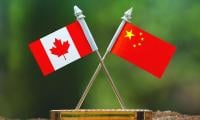 China Cuts Anti-dumping Duties On Canadian Oil Imports After Final Trade Decision
China Cuts Anti-dumping Duties On Canadian Oil Imports After Final Trade Decision -
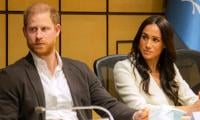 Prince Harry, Meghan Markle Make Major Change To Strategy To Please Royal Family
Prince Harry, Meghan Markle Make Major Change To Strategy To Please Royal Family -
 Chester Bennington’s Mental Health Story And Lasting Legacy
Chester Bennington’s Mental Health Story And Lasting Legacy -
 John Cusack Gears Up To Give Fans Exciting Surprise On Late-night Television
John Cusack Gears Up To Give Fans Exciting Surprise On Late-night Television -
 Yerin Ha Opens Up About Shocking Diagnosis Post ‘Bridgerton’ Season 4
Yerin Ha Opens Up About Shocking Diagnosis Post ‘Bridgerton’ Season 4 -
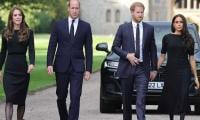 Meghan Markle, Harry Leave King Charles, Prince William Furious With Latest Move
Meghan Markle, Harry Leave King Charles, Prince William Furious With Latest Move -
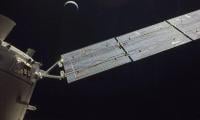 NASA Announces New Artemis Moon Mission Aimed At Expanding Astronauts’ Exploration Efforts
NASA Announces New Artemis Moon Mission Aimed At Expanding Astronauts’ Exploration Efforts -
 Everything To Know About Justin Bieber's Facial Paralysis
Everything To Know About Justin Bieber's Facial Paralysis -
 Morgan Stanley Predicts AI To Replace Tasks Not Workers
Morgan Stanley Predicts AI To Replace Tasks Not Workers -
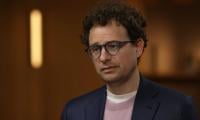 Anthropic Dario Amodei Calls White House Response ‘retaliatory’ In AI Safety Dispute
Anthropic Dario Amodei Calls White House Response ‘retaliatory’ In AI Safety Dispute -
 Tia Mowry Breaks Silence On Angelina Jolie Asking 'unbelievably' Personal Question: 'Wilder'
Tia Mowry Breaks Silence On Angelina Jolie Asking 'unbelievably' Personal Question: 'Wilder' -
 Savannah Guthrie Speculations 'sadly' Coming True About Mother Nancy
Savannah Guthrie Speculations 'sadly' Coming True About Mother Nancy -
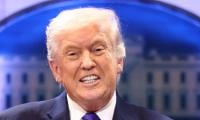 Trump Administration Warns Of Slow Payouts For Tariff Refunds Amid Intensifying Trade Disputes
Trump Administration Warns Of Slow Payouts For Tariff Refunds Amid Intensifying Trade Disputes -
 Princess Beatrice 'far From Comfortable' After Father Andrew's Arrest
Princess Beatrice 'far From Comfortable' After Father Andrew's Arrest -
 Sarah Ferguson’s Dual Cancer Journey
Sarah Ferguson’s Dual Cancer Journey -
 GTA 6 Security: Rockstar Blocks Leaks Ahead Of Launch
GTA 6 Security: Rockstar Blocks Leaks Ahead Of Launch
